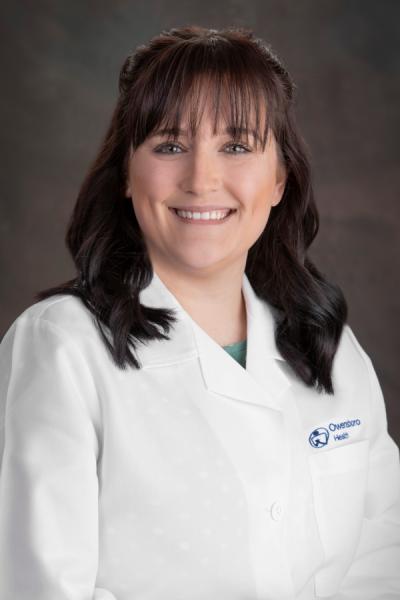Published on April 19, 2024
Owensboro Health Behavioral Health Serves New Moms

During pregnancy, there’s a great deal of focus on physical health. We take all the right steps to come behind expecting mothers, ensuring their bodies get what they need to stay healthy and fuel their baby’s development. Caring for their mental and emotional well-being, however, is often missed even though it’s just as important. We also tend to think of pregnancy as a series of precious and exciting moments. So, when women wrestle with feelings they can’t explain, they tend to suffer in silence. That’s why we’ve designed pregnancy and postpartum behavioral health services to ensure our moms and babies get off to the best possible start.
Ashly Skaggs, APRN at Owensboro Health Medical Group Behavioral Health, went into this specialty because she, herself, struggled with severe postpartum OCD. She struggled for more than a year before asking for help from her physician. When she later started working as a nurse in the NICU, she realized that postpartum mental health is a huge issue and often missed. In 2018, she changed her focus to helping other moms that were dealing with the same emotions she had. She now helps moms in a variety of ways:
Anxiety and Mood Disorders During Pregnancy
When you’re pregnant, your body undergoes many changes. You also likely have a lot on your mind: After all, life as you know it is about to change. Some anxious feelings, and even some moderate mood swings, are quite normal and usually go away on their own. But if these symptoms continue for more than a few weeks at a time or worsen over time, you may need help with a perinatal mood disorder (PPMD).
Depression After Delivery
Right after birth, your hormone levels drop, which naturally impacts your mood—as does the lack of sleep you’re probably getting with a new baby adjusting to life outside the womb. Up to 4 in 5 moms, in fact, experience what’s known as the baby blues, which refers to the feelings of sadness that can begin from the time right after birth to a few weeks following. In most cases, the baby blues go away on their own. If they don’t, though, and it’s been two weeks after birth, or longer, it’s important to talk with your doctor.
Conditions We Treat
With a provider who’s dedicated exclusively to supporting mental wellness throughout our patients’ pregnancies and beyond, you can feel confident we have every aspect of your care covered. We’re here to help women with the full range of peri- and postpartum behavioral health conditions, including:
- Perinatal ADHD
- Perinatal Anxiety
- Perinatal Bipolar Disorder
- Perinatal Depression
- Perinatal Eating Disorders
- Perinatal Obsessive-compulsive Disorder
- Perinatal Psychosis
- Perinatal Post-traumatic Stress Disorder
- Perinatal Schizophrenia
Compassionate, Specialized Care
When mental health conditions are left untreated during pregnancy, it can have negative health impacts on mom and baby, including increased risk for preterm birth, low birth weight and even poor nutrition after birth. Yet, according to recent studies, fewer than 1 in 10 pregnant women with a mental health illness receive adequate treatment, and fewer than 1 in 20 are actually cured.
Treatments for mental health illnesses either during or after pregnancy usually include a combination of medications and therapy. You can count on our highly skilled and caring team to work closely with you to plan a course of treatment that’s best for your condition and that meets your unique needs and preferences.
Schedule an Appointment
Women who are pregnant or in the postpartum period (12 months after delivery) can make an appointment with no referral by calling 270-417-7980. Ashly Skaggs, APRN, is also inpatient at Owensboro Health Regional Hospital Monday through Friday, 8 a.m. to noon, for consultations with any mom that is struggling with mental health while in the hospital. Virtual visits are available as needed.
About Owensboro Health
Owensboro Health is a nonprofit health system with a mission to heal the sick and to improve the health of the communities it serves in Kentucky and Indiana. The system includes Owensboro Health Regional Hospital, nationally recognized for design, architecture and engineering; Owensboro Health Muhlenberg Community Hospital; Owensboro Health Twin Lakes Medical Center; the Owensboro Health Medical Group comprised of over 350 providers at more than 30 locations; four outpatient Healthplex facilities, a certified medical fitness facility, the Healthpark; a weight management program, and the Mitchell Memorial Cancer Center.
On average each year, we have more than 19,000 inpatient admissions, deliver 2,000 babies and provide the region’s only Level III NICU. Owensboro Health physicians perform nearly 33,000 surgical procedures, including nearly 150 open-heart surgeries. Our physicians and staff have 90,000 Emergency Department visits and more than 1.25 million outpatient visits annually. Visit our home page for more information.